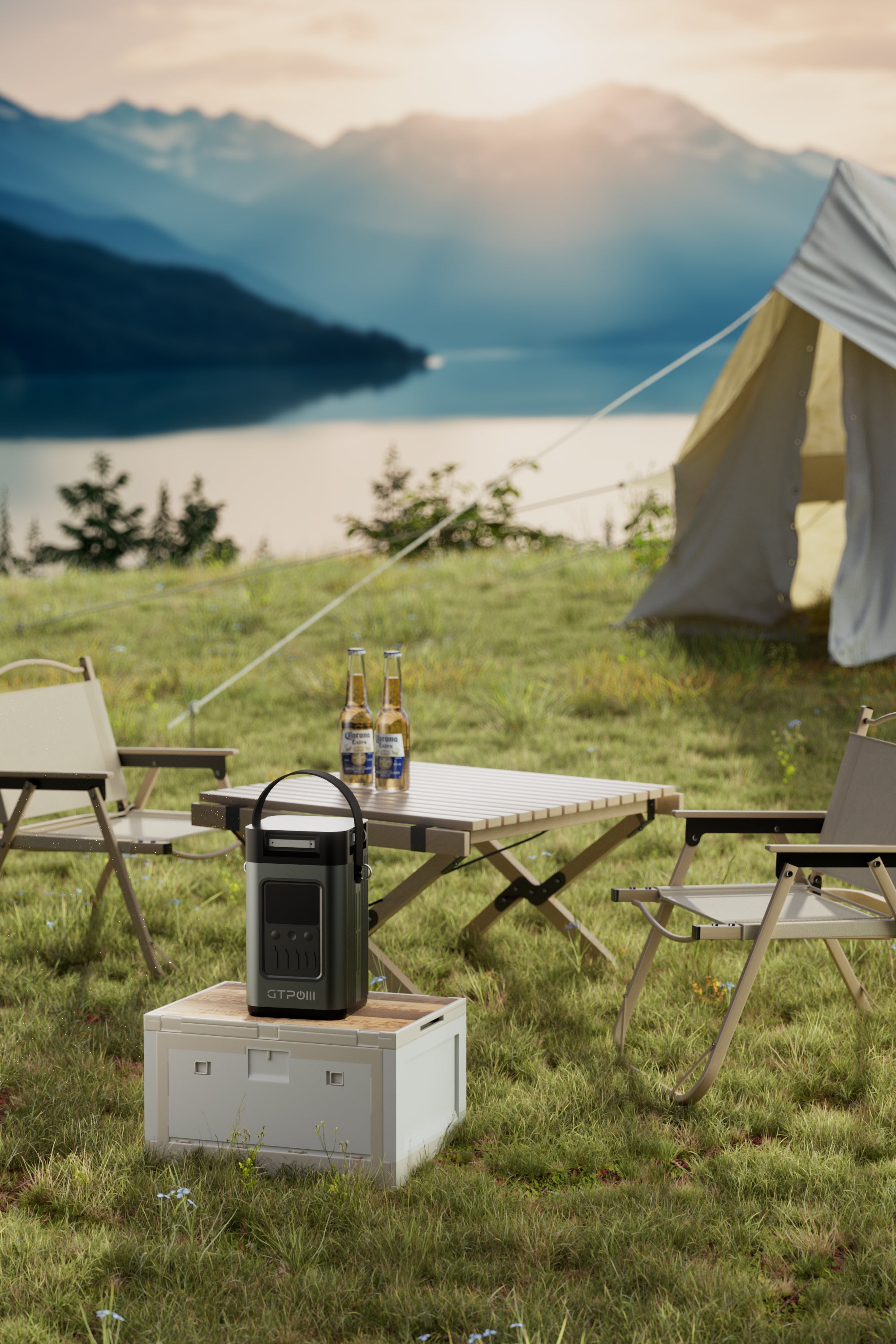The Pros and Cons of Small Portable Generators for Camping
Traditionally portable generators are known for emergencies rather than a peaceful camping trip in the woods. But small portable generators are a great item to include on your camping checklist.
There are certain creature comforts we can’t deny. For those who know, small portable camping generators are valuable in a number of outdoor situations. From powering outdoor lighting, and heating systems to facilitating the perfect playlist for your weekend outdoors, camping generators can be your new best pal.
Portable generators for camping can come in all different shapes and sizes and it can be a minefield out there. So we’ll walk you through the pros and cons before you take the plunge.

What Is a Small Portable Generator for Camping?
As the name suggests, a small portable generator is a power supply that can be picked up and taken with you. Typically, small portable generators range from 288-3600Wh and are a great way to have ready-to-use electricity while camping.
Why Do You Need a Small Portable Generator for Camping?
You’re probably questioning why you’d need such a thing when camping is time for solitude and relaxation. However, having a reliable source of power for lights, cooking stoves, and yes, even your phone, could make all the difference when you’re out in the wild.
Pros:
- They can be a lifesaver in an emergency situation.
- Freedom to camp wherever you want.
- They are relatively inexpensive and easy to operate.
- They can be used to power small appliances and electronic devices.
Cons:
- Some small portable generators can have clunky mechanical parts and can be quite loud.
- Some require fuel, so you’ll need to keep extra gas on hand or know where you can fill up while on your trip.
- Some campsites do not allow the use of portable generators due to how much noise they make.
The Pros of a Small Portable Generator for Camping

Your Emergency Option
When you’re out wild camping, hiking from place to place you could be miles from your nearest power outlet. Here’s where a small portable generator could make all the difference.
For instance, the US National Park Service reported that the most common injury is a sprained ankle or broken bone when out in the wild. In this scenario, a small portable generator comes up trumps. In this scenario, it could be hours until you’re found. A small generator can keep your phone charged or a GPS tracker online so help can find you.
Camping on Your Agenda
One of the main benefits of a small portable generator is the freedom it gives you. Camp anywhere you want without worrying about finding an electrical hookup.
While most campsites have a power hub you can tap into, it keeps you tied base. With a small portable generator, you can avoid the hustle and bustle of a campsite and explore unchartered territory.
Easy to Use
Another benefit of small portable generators is that they’re relatively easy to use. With most small generators you just have to add fuel and pull to start. But thanks to technological evolution, portable battery-powered generators are now here to stay. Simply click the electric start and you’re up and running.
Power Multiple Appliances & Devices
Small portable generators have improved leaps and bounds in recent years. You can pick up a small generator with a plethora of ports and outlets so you can charge and power all of your most important devices all at once.
The Cons of Small Portable Generator for Camping
However, there are some drawbacks to using a portable generator while camping. One is that non-battery options are noisy, so a portable gas generator might not be the best option if you’re looking for a peaceful camping experience.
Additionally, portable generators that run on fossil fuels produce harmful emissions, so it’s important to use them in well-ventilated areas. This isn’t the case for GTPOW SWIFT MAX POWER BANK range.
Finally, non-battery portable generators require regular maintenance, such as changing the oil and air filter. But there are green alternatives redefining the portable generator landscape.
Noise
One of the most spoken-about cons of small portable generators is how much noise they make. A traditional fuel-powered generator produces anywhere between 50-60 decibels. This equates to the sound of a normal conversation. But this is not ideal if you run your generator for long periods.
Fuel Supply
Although portable generators are a great source of electricity, they still need juice to run. Most traditional portable generators run on gas. Carrying around a spare tank of fuel on your camping trips is far from ideal. Plus, these types of generators produce toxic emissions, so you need to be careful where you use them.
Another concern is weight. On average, small portable generators for camping can weigh anywhere between 100-150lbs. Granted they are usually on wheels, but it can be the equivalent of carrying a baby hippo with you!
Final Thoughts?
To round up, there are a lot of portable generators you could take camping on the market. Most small portable generators have their cons, notably noise, weight, and fuel supply. But the pros of an emergency power supply and camping on your own agenda, overwhelming outweigh them. Plus, the small portable generators that the GTPOW SWIFT MAX POWER BANK has on offer, are making the cons a non-issue. Ultimately, the best portable generator will depend on your specific needs.


